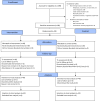A Smartphone App (WExercise) to Promote Physical Activity Among Cancer Survivors: Randomized Controlled Trial
- PMID: 41042984
- PMCID: PMC12494186
- DOI: 10.2196/75839
A Smartphone App (WExercise) to Promote Physical Activity Among Cancer Survivors: Randomized Controlled Trial
Abstract
Background: Cancer survivors face unique health challenges that may be addressed through physical activity (PA) interventions. Technology-based tools provide innovative, resource-efficient alternatives to traditional approaches, delivering PA interventions.
Objective: This study aimed to examine the effectiveness of a smartphone app (WExercise) in promoting PA among cancer survivors.
Methods: This study was an assessor-blind, 2-arm randomized controlled trial. The intervention group used WExercise, which consisted of automated weekly lessons developed based on the multi-process action control (M-PAC) framework. The control group received written PA recommendations. Ninety-eight physically inactive cancer survivors who had completed curative treatment were recruited from an oncology clinic and the community. Outcomes included exercise behavior (primary), exercise capacity, quality of life, and M-PAC constructs.
Results: The majority (81/98, 82.7%) of participants remained in the study. The proportion of participants completing at least 75% of lessons was 69.44%. For exercise behavior, mixed findings were identified: the intervention group had a significantly greater increase in self-reported moderate-to-vigorous PA compared to the control group at postintervention (mean difference in change 89.02 minutes, 95% CI 34.87-143.16) and 3 months postintervention (mean difference in change 49.37 minutes, 95% CI 8.63-90.10; group × time interaction; P=.003), while no significant effect on ActiGraph-measured moderate-to-vigorous PA was observed at postintervention (mean difference in change -8.54 minutes, 95% CI -36.19 to 19.11) and 3 months postintervention (mean difference in change 2.56 minutes, 95% CI -27.29 to 32.41; group × time interaction; P=.74). WExercise was also effective in increasing cancer survivors' exercise capacity but not their quality of life or M-PAC constructs.
Conclusions: WExercise demonstrated a significant effect on increasing self-reported PA, but this was not corroborated with ActiGraph-measured PA. The application may be a useful addition for clinicians aiming to promote physical activity in people with cancer.
Keywords: M-PAC; behavior change; cancer survivor; mHealth; physical activity.
© Denise Shuk Ting Cheung, Tiffany Wan Han Kwok, Sam Liu, Ryan E Rhodes, Pui Hing Chau, Chi-Leung Chiang, Anne Wing-Mui Lee, Chia-Chin Lin. Originally published in the Journal of Medical Internet Research (https://www.jmir.org).
Conflict of interest statement
Figures
References
-
- Cancer trends progress report. National Cancer Institute, NIH, DHHS. 2024. [24-09-2025]. https://progressreport.cancer.gov URL. Accessed.
-
- Xiao K, Tang L, Chen Y, Zhou J, Yang Q, Wang R. The effectiveness of E-health interventions promoting physical activity in cancer survivors: a systematic review and meta-analysis of randomized controlled trials. J Cancer Res Clin Oncol. 2024 Feb 2;150(2):72. doi: 10.1007/s00432-023-05546-9. doi. Medline. - DOI - PMC - PubMed
Publication types
MeSH terms
LinkOut - more resources
Full Text Sources
Medical


